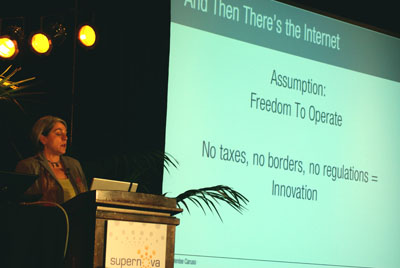Denise Caruso: Anti-social media defeats progress


"Innovation begets risk," Caruso said. "We can't calculate the probability of failure." Using the Internet to emphasize how technology can reshape society both for the good and bad, Caruso said that the assumptions of may entrepreneurs that they will, or must, have complete freedom and unfettered competition leads to very mixed consequences for the world.
She pointed"If we are going to overcome risk, we have to have conversations." to many historical examples of failures to balance innovation with considered application based on discussion among experts and stakeholders:
- Nuclear energy, which had to be completely re-engineered after spectacular disasters
- DDT...too much of a "good thing" led to the destruction of good bugs and drug- and insecticide-resistant bad bugs
- Genetic engineering: networks not lego blocks. We are now seeing that you can't tweak one gene and not affect many others, but the biosciences have proceeded from the idea that genes stand alone and can be freely interconnected, like Legos
- SGI-Time Warner full service network--No one talks about the melting settop boxes in the tesbed homes, but anyone could have predicted it based on the specs
"If we are going to overcome risk, we have to have conversations," she said. Convening groups of experts and stakeholders may be time-consuming, but the benefits are far greater than the cost. Many studies of projects and industries support the view that this is time well spent.
Conversation has created great products, like the Xerox Star (which ignited a number of threads of development that catalyzed personal computing). Another example Caruso cites was the development of a chemical weapons disposal project in Oregon that was originally a source of real conflict between the defense industry and environmentalists—by meeting and talking they found a sustainable and valuable solution to the problem of getting rid of these terrible weapons.
Caruso was joined onstage by Clay Shirky of NYU, who suggested "love" as a new industry meme and tied it to the open source phenomenon and survival.
"Millions of people woke up this morning loving Perl," Shirky said, citing the devotion among the community of the scripting language adherents to listen to each other, converse and write code for one another with a contract or financial exchange.
"Linux gets rebuilt every day by people who's goal is to make sure it exists in the morning," Shirky said. "Mailing lists and wikis turn love into a renewable material."
Love of a community for Perl, Apache, Linux or whatever will be an accurate predictor of longevity of software and services in the Web-driven world because the people who like it, take care of it, he said, and future commercial efforts will be inextricably intertwined with the communities built out of "love" for products and services.
"In the past we did little things for love and big things for money...now we can do big things for love," Shirky concluded.
Debate is essential to smart applications of technology, but the systems we rely on are designed to minimize our exposure to contradictory ideas and positions. We're creating an "anti-social media," Caruso said, that simply reinforces what we believe or want to market to people.
"This is not social media," she said. "It's anti social media." Targeted search, for example, discourages serendipity, which is essential to discovering novel combinations of ideas and views, which could seriously undermine the development of society. "Blogs encourage comments, not conversation."
And social networks encourage linking with people like us, rather than those who might make us uncomfortable or challenge our thinking.
"The nature of technology affects how we think and work in this world," Caruso said. She challenged the audience to think about how to automate serendipity and how can we create social networks of people not like ourselves. This is the grease on the skids that will move the network industry forward.